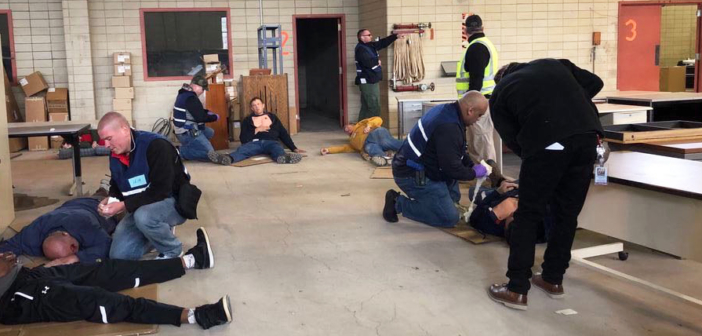The Lehigh University Police Department partnered with the Bethlehem Police Department for a three-day, nationally-recognized active threat training workshop at Mountaintop Campus from Oct 15-17.
The training was followed by two information sessions for the campus community on Oct. 22, and Oct. 24.
The federally-funded program comes from Louisiana State University’s National Center for Biomedical Research and Training, according to Lehigh Communications.
LUPD Chief Jason Schiffer hosted the training and said he has been trying to organize a seminar like it since last fall. He said the timing is not a result of any particular event.
“Since I’ve been at Lehigh for nearly two years, it’s been one of my desires to work more closely with the City of Bethlehem officers and fire and EMS to do exactly what this course is designed to do — to integrate us together, to make sure we know how to work together in any emergency situation,” Schiffer said.
Lieutenant Kevin Burd, an instructor for the NCBRT/Academy of Counter-Terrorist Education at Louisiana State University, was the lead instructor for the class. Burd also works for New Jersey’s Hunterdon County Prosecutor’s Office.
He said the material and its training draws from a national perspective and is based on past incidents, refined to develop lessons and solutions.
“We typically look for a mix of 40 to 45 fire, rescue, law enforcement personnel, dispatchers and emergency management officials to come together to work on the overall response and management of an active shooter event,” Burd said.
Burd said the training consisted of four different scenarios, and training groups practiced small portions over the three-day course. Everything is spontaneous and in-the-moment, he said, and the participants act out the scenarios based on what they learn in the courses.
In one drill, which mimicked an active shooter situation, law enforcement players had to decide whether or not to enter a building. There was also a scenario in which an active shooter shot two of the three officers, forcing the last-standing officer to act alone.
During the scenarios, law enforcement handled any injuries until it was safe for EMS personnel to arrive on the scene in order to practice integrative training — combining law enforcement and medical care in emergency situations.
There were 20 to 30 minute debriefing sessions between scenarios so participants could discuss what went well and devise strategies for improvement.
While emergency responders at Lehigh are receiving active shooter trainings and becoming more confident on how to react in such situations, some Lehigh students still seem unsure of what to do in this kind of scenario, Burd said.
Following this integrated training, LUPD hosted an active shooter response session on Oct. 22, where Lora Martin, LUPD crime prevention officer, gave an hour-long presentation on active shooter procedures, followed by a Q&A session. Approximately 20 faculty, staff and students attended.
Tyler Longo, ‘20, said he saw an email about the seminar and attended to become better educated about how to act in an active shooter situation.
Longo said this event was his first time at Lehigh where he was given information to this extent.
“No one wants to think about this; they don’t want to think it can ever happen,” Longo said. “It almost needs to be eased into … because it’s important (information) to know.”
Schiffer said LUPD plans to continue to educate Lehigh students and the local community about how to react in cases of active emergencies. Working with the Bethlehem Police Department in collaboration with this training is a step toward preparing the greater Lehigh community for potential incidents.
“I look at this as kind of the very beginning of hopefully a series of trainings and things that we do together,” Schiffer said. “It’s much better if we’ve already worked and trained together and know how to operate together to have the best outcomes.”






Comment policy
Comments posted to The Brown and White website are reviewed by a moderator before being approved. Incendiary speech or harassing language, including comments targeted at individuals, may be deemed unacceptable and not published. Spam and other soliciting will also be declined.
The Brown and White also reserves the right to not publish entirely anonymous comments.